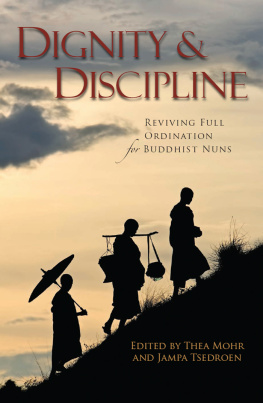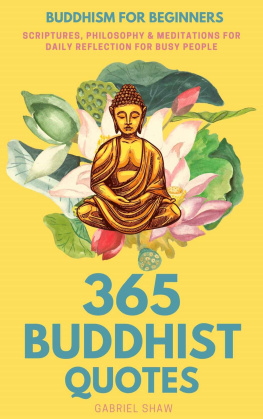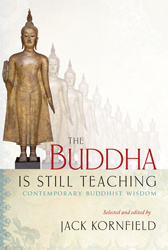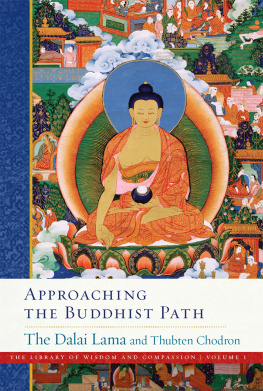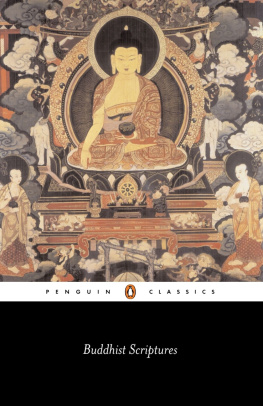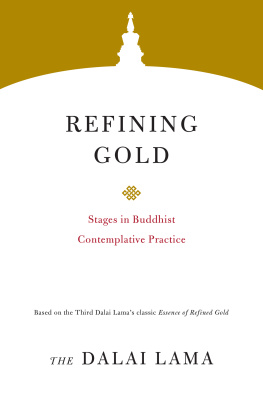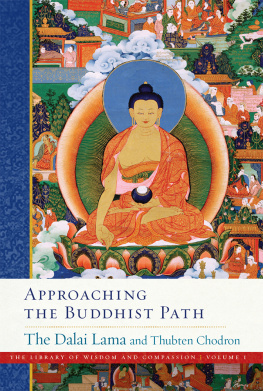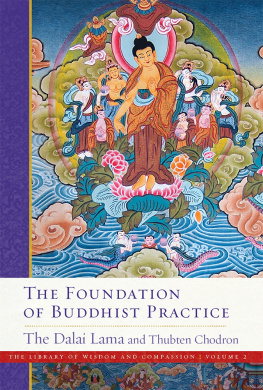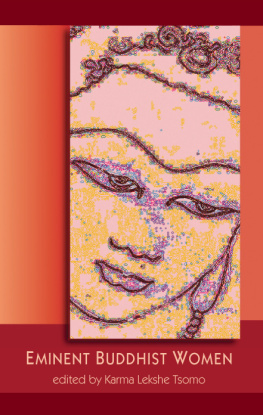Dignity and Discipline


| Contents |
THEA MOHR AND JAMPA TSEDROEN
JANET GYATSO
JENS-UWE HARTMANN
BHIKKHU SUJATO
GISELA KREY
ANLAYO
BHIKKHU BODHI
UTE HSKEN
DHAMMANANDA BHIKKHUN
TASHI TSERING
THUBTEN CHODRON
DAMCH DIANA FINNEGAN
LOBSANG DECHEN
DAVID JACKSON
PETRA KIEFFER-PLZ
SHAYNE CLARKE
JAN-ULRICH SOBISCH
HIS HOLINESS THE FOURTEENTH DALAI LAMA
KARMA LEKSHE TSOMO
A S FAR BACK as 1987, His Holiness the Dalai Lama had asked for an examination of the current Tibetan Buddhist practice of not ordaining nuns, or bhikus, a practice at odds with the times of the historical Buddha over twenty-four hundred years ago. An extensive study was initiated by the Tibetan Department of Religion and Culture (India), and during a visit to Zurich on June 28, 2005, the Dalai Lama stated:
There has been much discussion surrounding bhiku ordination, but no decision has been reached. We need to bring this to a conclusion. However, we Tibetans cant decide this alone; it needs to be decided in collaboration with Buddhists worldwide. Were the Buddha to come to the twenty-first century and see the situation in the world now, he might well modify the rules.
The International Congress on Womens Role in the Sangha held in Hamburg in 2007 that gave rise to the contributions in this book was intended to fulfill His Holinesss request for the revival of the precepts of fully ordained nuns (Skt., bhiku; Pli, bhikkhun) in Tibetan Buddhism. The scholars presented their papers to an audience of about 150 experts along with representatives of various Buddhist organizations, a broad range of academics, and members of the interested public. The conference concluded with a statement by the Dalai Lama, where he laid out the necessary steps for reestablishing full ordination of bhikus within the Tibetan tradition of Buddhism. At the same time, by including Buddhists of all traditions, the Hamburg conference aimed to create a worldwide consensus on the need for reestablishing bhiku ordination in all Vinaya schools of Buddhism where it does not presently exist.
The assembled scholars included prominent Buddhist nuns and monks in the field of monastic discipline and history. The papers presented evidence relevant to the current debate on the status of ordained women, drawing on research both on classic Buddhist texts and on contemporary traditions in China, Korea, Taiwan, Tibet, Vietnam, and South Asia.
The specific topics addressed were:
The status of women in Buddhism
The controversy over full ordination for women in Buddhism
The requirements and procedures for the full ordination of women and proposals for its restoration
The implications of full ordination for women in Buddhist societies
The potential for restructuring Buddhism in line with gender equity
Although full ordination is described in detail in the texts of all extant Buddhist traditions and the ordination is available for Buddhist women in China, Korea, Taiwan, and Vietnam, opportunities for full ordination are not available to women in the Tibetan and Theravda traditions, which includes Buddhists in Mongolia, the Himalayan countries, and South and Southeast Asia.
One reason the issue of full ordination for women has become a major concern in the contemporary international Buddhist diaspora is that gender discrimination is in direct conflict with the ethic of social and spiritual equality maintained in Buddhist theory. In other words, there is nothing intrinsic to the Buddhist worldview that relies on the subjugation of women, and in fact the inequality between the sexes that exists in some Buddhist contexts is in marked tension with the Buddhas ultimate understanding of reality and of the universal potential for enlightenment shared by all beings. Thus, reinstating full ordination for women will bring the Buddhist tradition more in line with its core ideals.
At this congress scholars approached the topic from textual, philosophical, sociological, and feminist perspectives. One objective was to discuss the opportunities Buddhism theoretically offers women for spiritual and social advancement and how this theoretical equality contrasts with womens actual opportunities for education, training, and religious and social advancement in Asian societies mainly influenced by Buddhism. Another objective was to assess the current prospects for reintroducing full ordination for women in those Buddhist traditions where it is not currently available.
The congress focused on analysis of the legal status of ordained Buddhist women and the formulas or rites used to ordain them. It looked at the historical background on the issue, reviewed the key issues surrounding restoration of the lineage, and analyzed and refuted the objections by opponents of bhiku ordination. The discussions also sought to highlight the role a vibrant bhiku sagha can play in preserving Buddhist cultural institutions. The ultimate goal was to elicit a clear statement from H. H. the Dalai Lama on how the bhiku lineage can be reestablished in the Tibetan tradition.
Preparations for the conference began in December 2005 when the Foundation for Buddhist Studies in Hamburg agreed to support the efforts to organize the conference. We are deeply thankful for the unceasing, wholehearted support that Gabriele Kstermann and the other board membersChristiane Meyer-Rogge-Turner, Professor Emeritus Lambert Schmithausen, and Dr. Wolfgang Treschergave to us. Without their advice and recommendationsand foremost their confidence in the importance of such a conferenceit would not have been possible. We also thank all the sponsors, especially the Tara Foundation, for their generous gifts.
With the munificent support of the University of Hamburg, we were able to achieve an atmosphere of serene scholarliness. All the members of the Committee of Western Bhikus helped us tremendously to contact the esteemed scholars worldwide, among them Ven. Prof. Karma Lekshe Tsomo, who has for decades organized the Sakyadhita conferences of Buddhist women in traditionally Buddhist countries. We are deeply indebted to all the scholars who contributed so valuably to the success of the conference with their presentations. Unfortunately not all the papers could be included in this book, but our deep appreciation goes out to all of the presenters. We are grateful for the interest of Wisdom Publications before the start of the actual conference, and for the cooperation of MacDuff Stewart, for whose highly efficient work we are deeply thankful. Our special thanks go to David Kittelstrom, who actually first offered to publish the proceedings with Wisdom Publications andafter some detourshelped to bring the project to a successful end. Finally we want to thank the Department of Religion and Culture (DRC) of the Tibetan Government in Exile and the chair of the Tibetan Nuns Project, Kazur Rinchen Khandro. In particular we thank Ven. Prof. Samdhong Rinpoche, Prime Minister of the Tibetan Government in Exile and chair of the DRC Bhikkun Ordination Committee, who always inspired us during the period of preparation as well as during the conference. Above all, His Holiness the Dalai Lamas desire for real progress in fully ordaining women practicing Tibetan Buddhism was a constant source of inspiration for all involved. Without it, the remarkable contribution the Hamburg conference made toward this goal would not have come about, and so we are deeply grateful.
Next page
